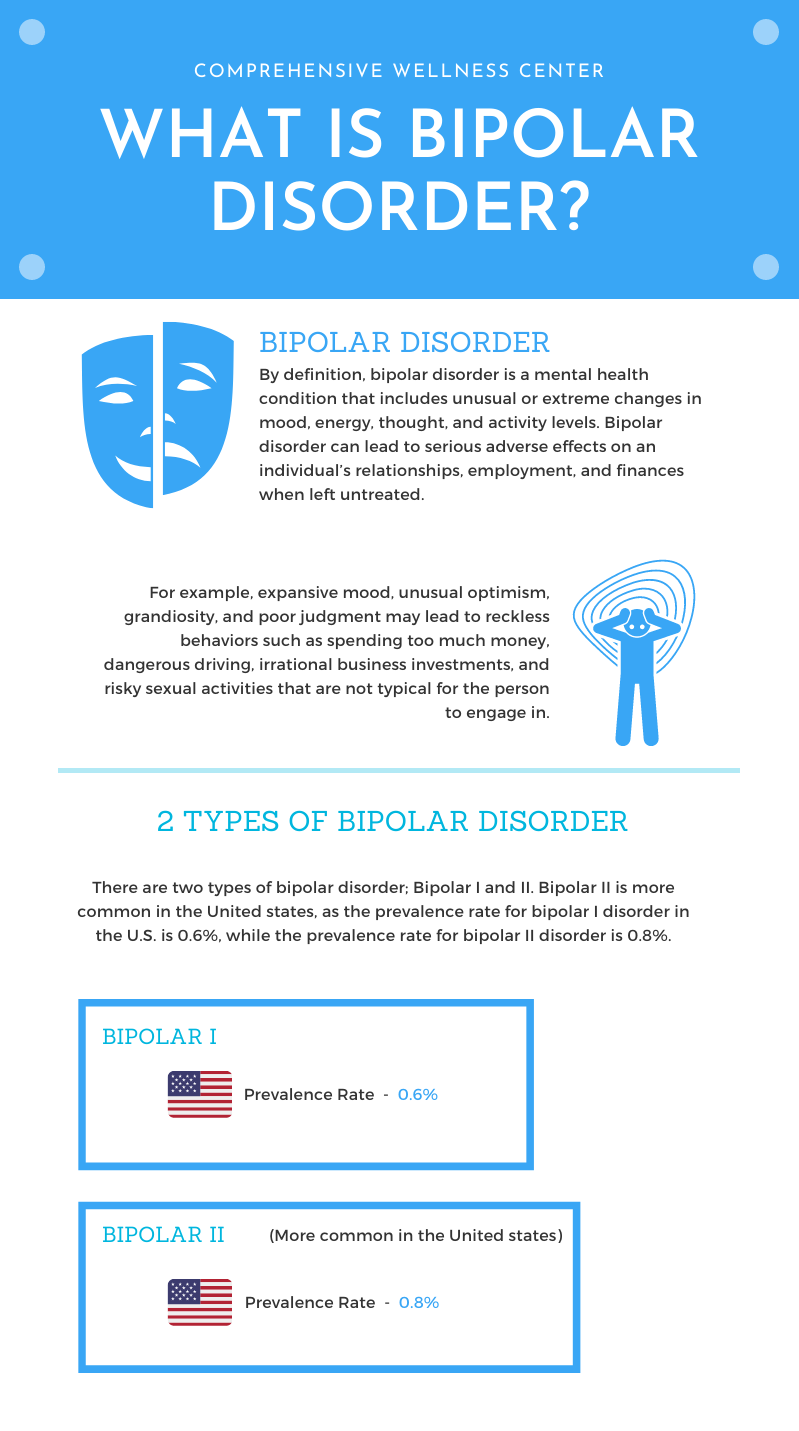Bipolar disorder is a mental condition characterized by sudden and intense shifts in mood, behavior, and energy levels. Similar to substance abuse, bipolar disorder poses risks to an individual’s physical and emotional well-being. Unfortunately, individuals suffering from untreated bipolar disorder have a higher rate of relationship issues, economic instability, accidental injuries, and suicide than the general population. Also, individuals with bipolar disorder are more likely to develop an addiction to drugs and alcohol. In fact, approximately 56 percent of individuals with bipolar have experienced drug or alcohol addiction during their lifetime.
If you are struggling with bipolar disorder and addiction, you may need to attend a dual-diagnosis treatment center near you. To explain, a dual-diagnosis is defined as suffering from substance use disorder as well as a co-occurring disorder. Dealing with a dual-diagnosis such as addiction and bipolar disorder can be extremely difficult, but dual diagnosis programs can help treat co-occurring disorders effectively.
What is Bipolar Disorder?

The Connection Between Bipolar and Addiction
Individuals who suffer from either type of bipolar disorder are more likely to suffer from substance abuse as well. In fact, more than half of individuals with bipolar I disorder also deal with addiction. On the other hand, 37% of those with bipolar II disorder have substance abuse disorders.
Oftentimes, individuals with untreated bipolar disorder use substances to cope with uncomfortable feelings. For example, someone dealing with a manic episode may decide to abuse opioids or benzos to calm themselves down. On the other hand, an individual dealing with a depressive episode may abuse stimulants in order to achieve heightened energy and chemical-induced happiness.
Individuals abusing substances may experience an initial decrease in symptoms, causing them to believe they have successfully managed their symptoms. However, they are putting themselves at risk in the long run. Chronic drug abuse and withdrawal symptoms tend to affect an individual’s mood, possibly leading to increased substance abuse and eventually physical and psychological dependence.
Additionally, another theory suggests that chronic substance use may “unmask” bipolar disorder. In other words, using a substance may lead to an increase in the severity of bipolar disorder symptoms that might otherwise not have been noticeable. If you or a loved one suffer from a co-occurring disorder such as addiction and bipolar, it may be time to consider attending dual-diagnosis treatment near you.
Treatment for Bipolar and Drug or Alcohol Addiction
Traditionally, bipolar disorder and addiction have been treated and addressed as separate conditions and, therefore, treated at separate facilities. People diagnosed with bipolar disorder would have been referred to mental health treatment centers or psychiatric hospitals. On the other hand, individuals suffering from drug or alcohol addiction would be sent to a rehab facility.
Today, medical professionals and addiction experts have recognized the importance of treating both bipolar disorder and substance use disorder simultaneously. This is done through a process known as “integrated treatment”. To explain, integrated treatment encompasses a number of different treatment strategies in order to address all mental health conditions a patient may suffer from. For example, a treatment program could include one-on-one psychotherapy with a mental health professional, counseling sessions with addiction specialists, dual diagnosis support groups, family counseling, and holistic therapy.
Important aspects of an integrated program for bipolar disorder and addiction include:
- Treatment techniques and plans for both addiction and bipolar disorder – provided in the same treatment facility
- A full team of treatment providers, including mental health experts, addiction counselors, and other medical professionals trained in the treatment of bipolar and addiction
- Individual therapy intended to help patients learn to manage their emotions and minimize the risk of substance abuse
- The option of psychiatrist medication that can help patients to handle the ups and downs of bipolar disorder when needed
- The access to peer group support from other patients who are also battling addiction and a mood disorder like bipolar
If both conditions are not treated simultaneously, it is unlikely for treatment to be effective. In other words, unless you receive comprehensive care for both conditions, your chances of relapse are high. For individuals with bipolar disorder, relapse prevention strategies have to include coping skills for managing the psychological and emotional triggers for substance abuse.
Dual-Diagnosis Treatment in West Palm Beach
Dealing with the effects of both addiction and bipolar disorder can be extremely difficult. Both conditions require extensive and comprehensive treatment for individuals to make a full recovery. If you or a loved one suffer from co-occurring disorders, it may be time to consider attending a dual-diagnosis treatment center. No one should ever have to recover alone, so CWC Recovery makes sure to provide patients with ongoing and unconditional support.
“At Comprehensive Wellness Centers, we fully understand the physical, psychological and spiritual impacts of addiction. As recovering addicts or family members of those suffering from substance abuse, the treatment staff at our drug rehab center in Florida has the experience, drive, and dedication to help you reach your goal of a successful and lifelong recovery. No matter how severe your addiction may be, Comprehensive Wellness Centers can tailor an individualized program that meets your unique needs.”
Contact us today for more information on our addiction and mental health treatment program.











